The Cancer Research Center of Laval University (CRC) was created thanks to the new regional vocation of the Centre de recherche en cancérologie de l'Université Laval, a multi-departmental and multi-faculty research center, founded in 1984.
Luc Belanger: CRC Founder and Emeritus Member
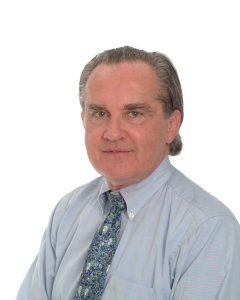
Clinician and researcher in oncology, Dr. Luc Belanger was also a full professor in the Department of Molecular Biology, MedicalBiochemistry and Pathology of the Faculty of Medicine at Université Laval. Dr. Belanger's career is that of a great builder and an extraordinary visionary who marked the development of oncology research in Quebec. Thanks to his exceptional involvement, the CHU de Québec and Université Laval have become key players in cancer research, both nationally and internationally. His remarkable research career aimed to better understand the transcriptional factors controlling hepatocellular differentiation and their use to antagonize the neoplastic phenotype.
Dr. Belanger was the founder and director of the Cancer Research Center at Université Laval from 1984 to 2012. He also founded and directed, until 2008, the Hôtel-Dieu de Québec Research Center , among the first multidisciplinary centers in Oncology. From 2008 to 2012, he headed the Oncology Division of the CHU de Québec Research Center. Dr. Belanger has played a key role in many other projects, such as the design and construction of the Center for Clinical and Evaluative Research in Oncology (CRCEO), inaugurated in 2006 and enabling the joint integration of basic and clinical research teams as well as oncology care teams.
He was also one of the founding members of the "Quebec-Consortium for Clinical Oncology Research" (Q-CROC), initiated in 2009. The objectives of this organization are to improve the capacity and quality of the clinical research infrastructure in Quebec and to offer better treatments to patients by allowing them greater access to quality clinical trials in oncology and personalized medicine.
We will remember a great pioneer and a man of exceptional vision and conviction, very close to his researchers and staff, who devoted his professional life to improving research and knowledge in oncology, as well as to provide a stimulating environment for those involved in cancer research.
Emeritus Members

Alan Anderson
A member of the Université Laval faculty since 1971, Professor Alan Anderson from the Department of Biology is a distinguished figure and one of the founding members of the CRC. He stands as a pioneer in the field of molecular biology at Université Laval. Collaborating with Dr. Luc Bélanger, they achieved a significant milestone as the first to clone a gene (rat AFP) at Laval University.
With his profound expertise in molecular biology and pharmacology, Professor Alan Anderson's research interests encompass human genetics and drug metabolism, with a specific emphasis on the regulation of hepatic induction of cytochromes P450 and its link to carcinogenesis. It is important to highlight that, in collaboration with Dr. Luc Bélanger and Prof. Normand Marceau, Prof. Anderson conducted groundbreaking research on gene regulation related to onco-fetal (AFP) and post-natal (P450) markers, exploring their role in the proliferation and differentiation of hepatic cells, including stem cells and hepatocyte maturation. The quality of his research program has earned him substantial support from granting agencies, notably the CRM/CIHR and the CRSNG.
For many, Prof. Anderson exemplifies the ideal university professor—a scientist engaged in cutting-edge research while excelling as an educator. His teaching is marked by exceptional quality and is highly valued by students, as he has imparted fundamental concepts in biology and molecular genetics to multiple generations of students at all academic levels. Prof. Anderson has been actively involved in various capacities, including his contributions to the program committee of the biology department, where he served as Director. Additionally, he played a significant role in the scientific library committee, serving as Chairman of the advisory committee.
As a member emeritus, the CRC acknowledges Professor Anderson's national and international reputation as a research pioneer within our academic community. His contributions have not only enriched our local research landscape but have also made a profound and enlightening impact on the global academic scientific community.
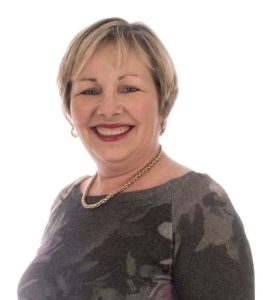
Michèle Aubin
Michèle Aubin completed her medical training in 1980 and has been a member of the College of Family Physicians of Canada since 1996. In 2010, she obtained her Ph.D. in Epidemiology under the supervision of Dr. René Verreault, focusing on the role of the family physician in the follow-up of patients with lung cancer. She has made a significant contribution to research in oncology and palliative care, covering the entire spectrum of cancer from diagnosis to treatment, end-of-life care, and post-treatment survival. She has participated in several research projects in Quebec, Canada, and internationally, addressing topics such as pain evaluation, interventions to alleviate pain and cancer-related fatigue, interprofessional collaboration, clarification of the roles of family physicians and nurse navigators in oncology, continuity of care and services in oncology, and the satisfaction of nurses in oncology and palliative care.
As the Chairholder of the Palliative Care Research Chair (2004-2020), she led a significant resource for the palliative care research community at Université Laval by providing scholarships to students and awarding pilot grants to palliative care teams, which subsequently obtained provincial and national grants. She has also served as a mentor to numerous students pursuing graduate research in oncology and palliative care, many of whom have become professors and researchers in the field.
As a clinician-researcher, she has received significant provincial and national grants as a principal investigator since 1990, while maintaining a clinical workload and a training program for residents. She was the recipient of an Excellence in Research Award from the College of Family Physicians of Canada in 2007. She also received the Excellence in Teaching Award from Université Laval - Volume pédagogique, in collaboration with other colleagues, for the book titled "Soins infirmiers aux aînés en perte d'autonomie" (2014). She has collaborated as a co-researcher on over 65 grants, totaling over $17 million. Among these, she participated in two major training programs funded by the Canadian Institutes of Health Research (CIHR), bringing together leading researchers in palliative care and supportive oncology from across the country. These transdisciplinary graduate research training programs have contributed to the development of a new generation of clinical researchers in palliative care and psychosocial oncology, positioning Canada as a global leader in these fields. She was also a founding member of the Réseau québécois de recherche en soins palliatifs et de fin de vie (RQSPAL), a central hub of expertise in the province.
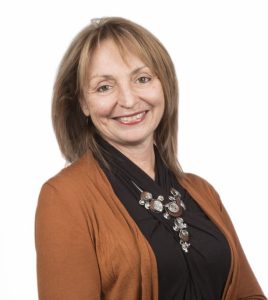
Lise Fillion
After studying nursing and psychology, Lise Fillion pursued a postdoctoral fellowship in behavioral medicine (health psychology) at the University of Miami under the supervision of Neil Schneiderman. From the beginning of her career, she utilized her exceptional clinical skills to assist individuals with cancer and those facing emotional and existential challenges. Professor Fillion particularly distinguished herself in the field of palliative care and psycho-oncology, as evidenced by her numerous successes in major research projects funded by prominent provincial and national grant agencies. She also served as a role model for many graduate students who successfully completed their master's and doctoral training.
Professor Fillion made significant contributions to the improvement of nursing practices in oncology and palliative care through her work on the development of the nurse navigator role and the implementation of systematic distress screening for individuals with cancer in outpatient oncology clinics. She also showed a keen interest in the job satisfaction and well-being of nurses working in oncology and palliative care, leading her to develop a research program aimed at enhancing the organization of care and services in these areas. It is also worth highlighting her exemplary skills in interprofessional collaboration, which enabled her to establish connections with multidisciplinary research teams across Canada and demonstrate her leadership.
The numerous accomplishments of Professor Fillion have been widely recognized by local and national bodies, resulting in numerous awards and prizes that highlight the excellence of her work. In 2011, she notably received the prestigious Rachel-Bureau Award, the highest distinction bestowed upon a nurse by her peers. Additionally, she won the Sirius Award presented by the CHU de Québec-Université Laval for an innovative project on managing the transition to cancer.
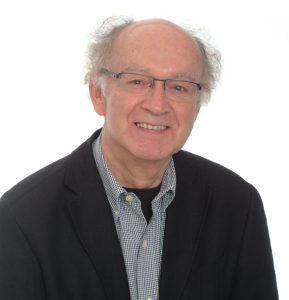
Jacques Huot
Founding member of the CRC in 1984, director of the Oncology axis of the CRCHU de Québec-Université Laval and member of the CRC's Management Committee (2012-2015), Dr. Jacques Huot is one of the pioneering researchers who established the experimental bases allowed the emergence of a field of biomedical research in cell signaling of the stress response, in Quebec and Canada. He played a key role in the creation of the “Signalisation-Québec” network with Drs. Nathalie Rivard and Josée Lavoie.
His collaboration with Dr. Jacques Landry, member emeritus of the CRC, led to the identification of the molecular chaperone HSP27 and its phosphorylation as important factors in cellular resistance to oxidative stress and certain anti-cancer drugs. These results are among the first to suggest a role for heat shock proteins in cancer cell resistance. Since then, the targeting of stress proteins in cancer has been used as a potentially selective therapeutic approach.
His work demonstrated for the first time that the p38 pathway was responsible for the phosphorylation of HSP27 in response to the growth factor VEGF and that it regulated the migration of endothelial cells. Previously perceived as a signaling pathway for stress, the p38 pathway was thus established as an important pathway for regulating cell motility. Dr. Huot has deciphered the p38 pathway activated by VEGF and provided evidence of its role in the regulation of angiogenesis and metastatic progression. With Dr. Martin Simard, he reported the first evidence of the role of microRNAs in the regulation of p38 activity. Another achievement of Dr. Huot was to demonstrate the role of the ERK/DAPK/tropomyosin1a axis in the regulation of actin dynamics. Finally, his collaboration with Drs Isabelle Corre and François Paris from Nantes has helped to clarify the role of p38 and nucleophosmine in the response of endothelial cells to oxidative stress.
The Department of Molecular Biology, Medical Biochemistry and Pathology of Laval University's Faculty of Medicine recognized the importance of his achievements by awarding him its Excellence Award in 2015. In 2012, he received the Jacques Leblanc Prize for the quality of its supervision of 2nd and 3rd cycle students.
Dr. Huot has always been heavily involved in teaching at the three university cycles. He has largely contributed to the creation of undergraduate courses in pharmacology in dentistry and nursing. He was a pillar professor in the 2nd and 3rd cycle Molecular and Cellular Biology programs. With Dr. Normand Marceau and Dr. Josée Lavoie, he set up one of the most popular optional courses for students in the "research" programs of the Faculty of Medicine, namely the course: Cellular and Molecular Foundations of Cancer . He has taught courses on more than 50 different subjects, pharmacology and cell biology.
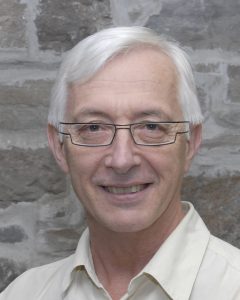
Jacques Landry
A founding member of the CRC in 1984, Dr. Jacques Landry is a world expert in cell signaling of stress. This activity focused on understanding the molecular mechanisms that control the cellular response to stress, and in particular, the role of small HSPB molecular chaperones in the resistance of cells to thermal, chemical or physical stress. His work is the basis of several of the major innovative concepts that have guided research in this field, and which involve the small chaperones of the HSPB family in the resistance of cancer cells to several stresses, in particular the drugs used in chemotherapy. In addition, Dr. Jacques Landry first made a major discovery when he first demonstrated that the small heat shock protein HSP27 (HSPB1) protects mammalian cells against the toxic effects of heat. hyperthermia (Journal of Cell Biology 1989, >622 citations). This finding served as a paradigm for subsequent studies leading to the identification of key roles for stress proteins in pathophysiological situations such as cancer. Subsequently, his team showed that the protective role of HSP27 was linked to its phosphorylation downstream of the MAP kinase p38, thus supporting the existence of specific signaling pathways activated by stress. This is how he was able to impose a non-classical view of the function of small chaperones, in the regulation of actin dynamics, and more recently, in the targeting of proteins towards degradation by selective autophagy.
Taken together, Dr. Jacques Landry's fundamental work has greatly contributed to the recognition and development of signaling controlling cellular resistance to proteotoxic stress, a field of research with significant implications for cancer treatment. The impressive number of citations associated with his publications testifies to the importance and innovative nature of his discoveries (> 14,000 citations), which earned him a Research Chair in Cellular Stress Signal Transduction as well as a uninterrupted support for 35 years of CRM/CIHR funded research in this area!
Dr. Landry's contributions to the academic and scientific training of our center's graduate students as well as to the development and mission of the CRC have been remarkable.
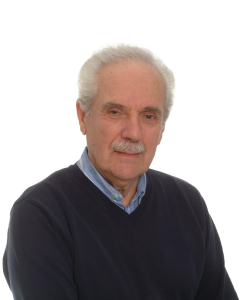
Normand Marceau
Dr. Normand Marceau joined the Faculty of Medicine at Laval University in 1971. He subsequently accepted Dr. Luc Bélanger's invitation to found the Hôtel-Dieu de Québec research center (CRHDQ), leading a few years later to CRC university training/recognition. There, he set up a very efficient and useful cell imaging unit for the research programs of researchers and students in the university community. A visionary, he enabled the Center to acquire the first confocal microscope in the Quebec City region in the early 1990s and to develop cutting-edge research in cell biology focused on the dynamics of living cells.
Dr. Marceau has left his mark internationally in the area of liver cell differentiation in relation to normal and cancerous development in the liver, as well as in the area of intermediate filaments (IFs), more specifically the multifunctional character of keratins simple epithelium. His initial interest in keratins came from the fact that they form a multigene family of proteins expressed in pairs according to cell type and stage of differentiation, hence their usefulness for typing normal and cancerous epithelial cells. However, the keratin IFs of keratinocytes were already known for their viscoelastic properties and from there, his team became interested in their functions, both mechanical and non-mechanical, focusing on liver cells. For the past fifteen years, his team has focused on the involvement of K8/K18 FIs in the regulation of migration, metabolism and death by apoptosis of these cells, in a context of cell signaling. Among other things, his data shed light on the modulating action of K8/K18 FIs at the level of lipid rafts through signaling pathways regulating the formation and distribution of actin filaments to the plasma membrane. The significant significance of this research is found in the context of liver disease, particularly cancer.
Research is not Dr. Marceau's only passion. He has always shown great commitment to his community, but he has always had an academic vocation. His gestures show that he considers himself a researcher, but also a teacher. Dr. Marceau's various achievements were made with exceptional vigor and determination. Nevertheless, they were carried out with constant respect for his colleagues. In this respect, Dr. Marceau was an example of a generous and helpful professor-researcher. Many will remember his expert advice, tinged with a wisdom that is particular to him.
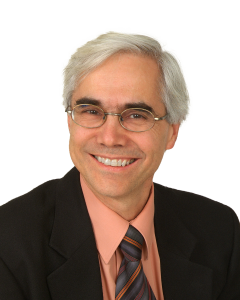
Bernard Têtu
In 1986, Dr. Bernard Têtu joined the CRC in 1986 following his recruitment at the Faculty of Medicine of Laval University. He was promoted to Full Professor in 1995, then appointed Head of the Pathology Division of the Department of Medical Biology in 1998. He was also Assistant Director for Clinical Research at the CRCHU de Québec-UL from 2006 to 2011 as well as Head of anatomopathology department of the CRCHU de Québec-UL from 1998 to 2006. Professor Têtu's contribution to training the next generation in anatomopathology is considerable. He has directed or co-directed the research projects of more than twenty graduate students and supervised those of many students and residents in anatomopathology and other specialties, many of whom have become clinician-scientists.
One of his most significant achievements is undoubtedly the biobank of more than 5,000 oncological specimens that he established at the CHU de Québec-Université Laval. He also collaborated on the IUCPQ biobank, which contains some 3,500 lung cancer tissue samples. His expertise in oncological pathology is recognized across the country. He is also a pioneer in the field of telepathology in Quebec. In fact, since 2011, several health establishments in Eastern Quebec have been able to rely on the services of a pathologist virtually at all times thanks to the unique network set up by Bernard Têtu's team.
Dr. Têtu has made a considerable contribution to the mission of our university topic center. His passion for research and teaching will have marked the CRC while the biobanks he has set up over all these years constitute an invaluable legacy that will continue to serve all our researchers for years to come.